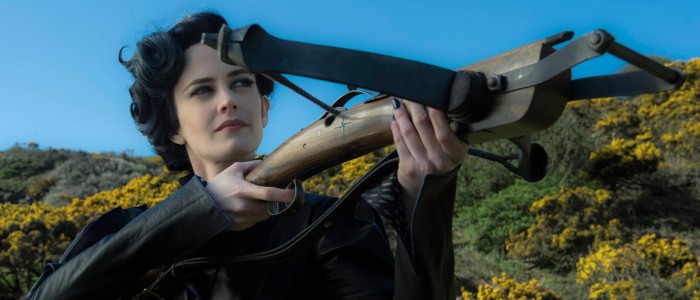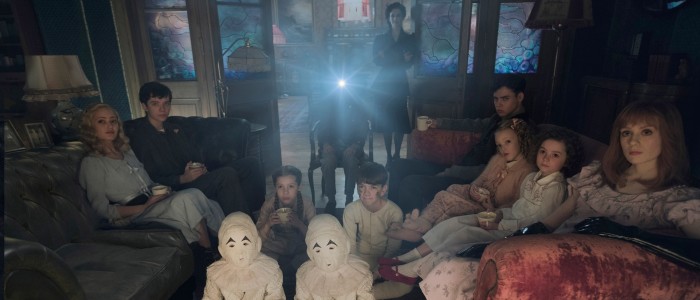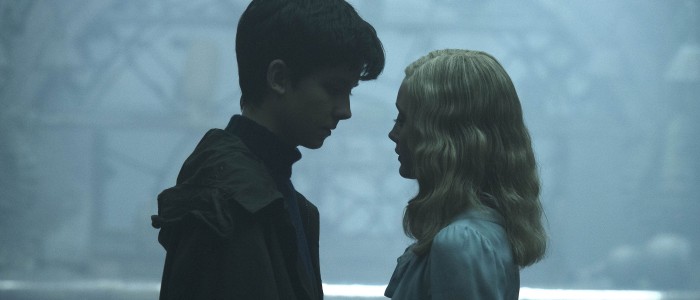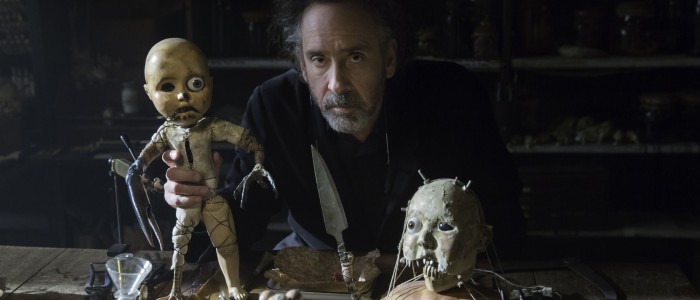Tim Burton's 'Miss Peregrine's Home For Peculiar Children' Needs More Peculiarity [Review]
On paper, Miss Peregrine's Home for Peculiar Children sounds like a perfect combination of talent, material, and timing. It's essentially an X-Men movie, in keeping with the current craze for superhero films, but one with a fanciful gothic vibe. It is directed by the master of fanciful gothic vibes, Tim Burton — who knows a thing or two about superheroes and big-budget blockbusters already. It's led by the living Tim Burton drawings Eva Green and Asa Butterfield. Oh, and it's based on a bestselling novel by Ransom Riggs.
In short, it has all the makings of a big hit that brings some much-needed quirkiness back to the multiplex. So why, then, does it all feel so... uninspired? So familiar? So not-very-peculiar?
 Miss Peregrine opens in sleepy suburban Florida, where teenage Jake Portman (Asa Butterfield) lives a life so unremarkable he might as well not exist at all. His parents (Chris O'Dowd and Kim Dickens) barely seem to notice him; the popular kids at school certainly don't. His closest friend might be his paternal grandfather Abraham (Terence Stamp), but sadly he is killed off by a Slenderman-like creature within the minutes of our meeting him.
Miss Peregrine opens in sleepy suburban Florida, where teenage Jake Portman (Asa Butterfield) lives a life so unremarkable he might as well not exist at all. His parents (Chris O'Dowd and Kim Dickens) barely seem to notice him; the popular kids at school certainly don't. His closest friend might be his paternal grandfather Abraham (Terence Stamp), but sadly he is killed off by a Slenderman-like creature within the minutes of our meeting him.
As Jake struggles to come to terms with Abraham's death — and the uneasy feeling that something isn't quite right about it — he heads to Wales to seek out the orphanage where Abraham grew up. He soon learns, though, that it's no ordinary children's home. It's a haven for "peculiar" kids with superpowers, hidden inside a time loop set to September 3, 1943 and overseen by the unflappable Miss Peregrine (Eva Green). Imagine if Mary Poppins took over Xavier's School for Gifted Youngsters and furnished it with wares found by searching for "steampunk" on Etsy, and you've more or less got the idea.
But wait, there's more: Miss Peregrine and her children are in danger thanks to the evil Mr. Barron (Samuel L. Jackson), who commands a team of wights (evil peculiars, basically) and hollowgasts (those Slenderman-like monsters) and believes these peculiars are their key to immortality. And wouldn't you know it, it turns out Jake has a secret of his own that might make him the peculiars' last, best hope for survival.
If you're still a bit confused about all of that, not to worry. Miss Peregrine spends most of its running time explaining itself. These minutes are used up introducing the various peculiars and their powers in great detail; recounting the history of Mr. Barron and his allies; half-heartedly dropping hints about Abraham's past; and establishing the rules that guide this universe. It's not until about an hour into the film that a character even gets around to explaining to Jake how, exactly, he fits into all of this. (Seriously, an hour. I checked my watch.) Even once we get to the third act, this film is still explaining things. The villain's climactic monologue boils down to a recap of all of his actions so far.
While Miss Peregrine gets caught up in all of this world-building and mythology-spinning, though, it fails to explore some of the most obvious and interesting questions raised by the premise. It's confirmed that Miss Peregrine's children have lived for decades, but never age thanks to the time loop. What's the psychological toll, then, of 70-plus years' worth of memories on a person forever destined to look 16 years old or even 5 years old? Where did all of these peculiar children come from, and what happened to their families? For that matter, are Jake's parents concerned that their kid has basically disappeared?
Nor does Miss Peregrine really bother to flesh out any of its peculiar children. Each is defined by his or her power, and beyond that the characterizations don't get much deeper than "nice" or "not as nice" or "likes fashion." Not even Jake gets much depth. By the end of the movie, I still couldn't have told you a single personality trait he possessed.
Perhaps the film's indifference its own lead character explains the flatness of Butterfield's performance. He's wholly unconvincing here, which is all the more disappointing since he's proved such a compelling presence in films like Hugo and Ender's Game. He struggles with his American accent, never more obviously than in scenes with Chris O'Dowd whose American accent is even worse. I found myself wishing Burton had just taken pity on his stars and let them keep their natural accents, especially as there is no narrative reason the characters need to be American.
Elsewhere, the cast is stacked with fine actors who have nothing to do. Kim Dickens, Judi Dench, Allison Janney, and Rupert Everett take turns dropping by the set to pick up their paychecks; Terence Stamp works only a little bit harder for his. Eva Green and Samuel L. Jackson are the only grown-up actors who get any real meat to chew on. Thank goodness, then, that both are blessed with the ability to make a meal out of even the paltriest portions.
Green has frequently emerged as the best part of some rather bad movies (e.g., Sin City: A Dame to Kill For, 300: Rise of an Empire, Burton's Dark Shadows) and she fills that role again here. Her Miss Peregrine is endlessly watchable, even when she's doing little more than standing around and watching. Jackson, meanwhile, goes gleefully over the top. He's saddled with dialogue as clunky and awkward as anyone else's, but he delivers his lines with such relish he almost makes it work. One of the few times Miss Peregrine really seems to come alive is during a scene in which the two characters confront each other.
The other times Miss Peregrine really sparks are when Burton gets to return to the misshapen and macabre quirkiness that has powered his biggest hits. A scene involving grotesque inanimate objects come to life looks like something out of his '80s output. And a big third-act setpiece, involving giant candy-covered skeletons lumbering around a carnival, is delightfully bizarre. (It's certainly a nice change of pace from the "portal over New York City" climax we've seen in what feels like every other movie this year.) Both scenes bring to mind the rough-edged practical effects of Burton's older films, and both serve as reminders that when Burton is on top of his game, he serves up dark whimsy better than almost anyone.
For the most part, though, Miss Peregrine looks and feels exactly like the slick, CG-heavy modern blockbuster that it is, less Batman Returns or Beetlejuice than Alice in Wonderland (but less coherent and less interesting). Despite its stated obsession with all things "peculiar," there's little about this movie that is actually surprising. It comes across like a movie going through the motions of setting up a franchise, not a movie eager to bring you on a wild adventure in a whole new world. Which is a shame, because the best parts of Miss Peregrine suggest the better movie we could have had. I'm not usually one for nostalgia, but I left the theater thinking, If only Burton had been able to direct this 25 years ago.
/Film rating: 5 out of 10



